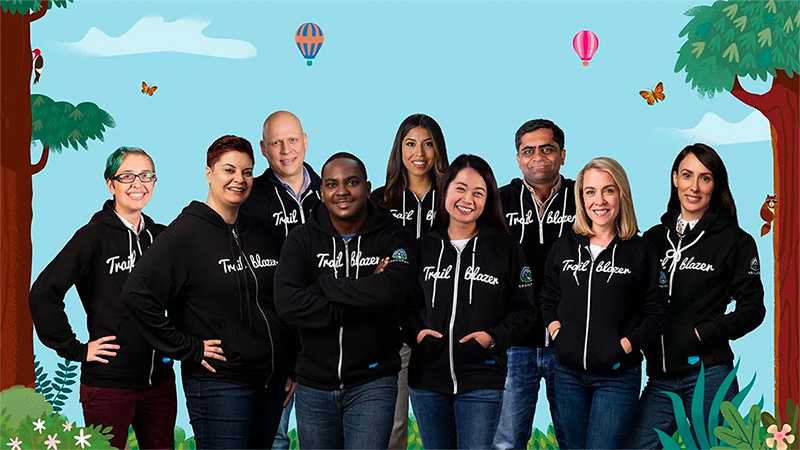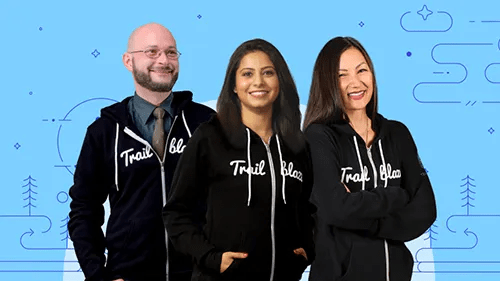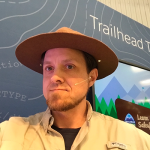Salesforce helps more than 150,000 customers in every industry connect with their customers. People worldwide and in Australia and New Zealand rely on our Customer Relationship Management (CRM) platform and Salesforce Customer 360 to keep their businesses running effectively and efficiently.
Here, we’re talking about all the developers who work with Salesforce technologies to build solutions for our customers and partners. Salesforce, of course, employs a lot of developers who build our products. If that sounds more like you, check out our engineering blog. But since Salesforce runs Salesforce on Salesforce, much of what you read here may still apply.
How developers work in the world of Salesforce
With Salesforce, you can build solutions using a combination of no-code tools and code. The right tools for the right task. We call this low-code development. Through no-code customisations, developers solve some requirements without coding. This means when they do code, they end up writing less repetitive or boilerplate code.
Salesforce products are expansive, covering sales, service, marketing, analytics, commerce, and more. Every part of Salesforce exposes APIs. Developers use these to create web apps on Heroku, supercharge their integration with MuleSoft, or even customise one of the standard applications. It’s fair to say that any developer can be a Salesforce Developer.
What does a developer do with Salesforce?
Most developers who work with Salesforce technologies build custom business apps and solutions. They do this either with the Salesforce Platform (including Sales Cloud, Service Cloud, and Experience Cloud communities) or with Heroku. While some developers specialise, most fit the description of full-stack developers working with both back-end logic and front-end experiences.
Beyond the Salesforce Platform, there are many other opportunities for developers in the world of Salesforce. Some build custom marketing experiences on Marketing Cloud. Others plumb the depths of data and expose new insights with Tableau. There are developers building engaging commerce experiences with Commerce Cloud’s PWA kit. Others craft their company’s digital HQ with custom Slack apps.
Salesforce technologies offer opportunities for developers to work with every aspect of business applications.
Which skills does a developer need to work with Salesforce?
Code is the stock-in-trade of every developer, so you may wonder which programming languages you might use. A lot depends on which part of the Salesforce world you choose to work in.
The two most prominent languages in the Salesforce world are JavaScript and Apex. JavaScript is, of course, the language used for front-end customisations as surfaced through Lightning Web Components. Apex is the most widely adopted back-end language in the Salesforce ecosystem.
The Salesforce Platform also has two domain-specific query languages. Salesforce Object Query Language (SOQL) is a SQL-like query language for accessing data in the Salesforce multi-tenant database. Salesforce Object Search Language (SOSL) is a text-based search language that can be used to find both data and documents stored on the platform.
In addition to the Salesforce Platform, certain products support other languages. Both Python and JavaScript are supported languages for the Slack Bolt SDK. For customised marketing experiences, you may use AMPscript for Marketing Cloud. If you build integrations with MuleSoft, your data transformations can be written in DataWeave. If you work with dashboards in Salesforce CRM Analytics, you might use the Salesforce Analytics Query Language (SAQL) to fine-tune visualisations. And, most recently, Data Cloud gives access to its data using SQL.
The technology and language landscape for Salesforce is rich and broad. No matter your interests, you can find a niche to master.
Discover Developer Centres
Get tools, technologies, and resources to help you innovate on Salesforce.


Since Salesforce offers no-code customisations, every developer working in the Salesforce ecosystem will end up learning how to use the no-code tools that support their work, too. For instance, certain features that can be complex to implement, like wizards, data security rules, and basic user interface (UI) customisations, can all be can be accomplished without coding at all.
Developers with previous experience in enterprise software tend to make the easiest transition to working in the world of Salesforce. But this is by no means a requirement. Again, any developer can become a Salesforce Developer. Many have joined directly from college or moved over from other software engineering experiences.
What are the career prospects for a developer who works with Salesforce in Australia and New Zealand ?
As the ecosystem around Salesforce grows, developers continue to be highly sought after. In the past 5 years, the number of new developer positions has increased by 165 percent on average year-over-year. And based on U.S. data, a starting salary for a developer is $105,000 per year.
Developers often come to Salesforce as a career opportunity. Once here, many get hooked on the friendly support of the Salesforce Developer Community. You can also connect, share ideas, and build your skills through local, in-person meetups.
Join the conversation virtually with developers daily through the Salesforce Developers group in the Trailblazer Community on Trailhead—Salesforce’s free online learning platform. Take your learning and networking even further by attending one of the community conferences found worldwide and in Australia and New Zealand.
Connect with Trailblazers from anywhere
Join the conversation in the Trailblazer Community.




Which credentials and certifications are relevant for the job?
As a developer, you want to work with the most relevant technologies, languages, and platforms. No language is more universally relevant today than JavaScript. You can show your JavaScript competence by earning the JavaScript Developer 1 Certification. This certification tests your knowledge of JavaScript in the browser and in NodeJS.
While used to validate the skills of many candidates in the Salesforce ecosystem, because it’s focused on universal knowledge, any company can use this certification when looking to hire a JavaScript developer.
To demonstrate your competence in developing with Salesforce Platform-specific features, tools, and technologies, you can pursue several paths. To learn about all the platform features that require no coding, you can take the Platform App Builder Certification.
To show knowledge and understanding of different programming features, earn your Platform Developer 1 Certification (PD1). Once you have your PD1, you can go further by pursuing the practical, hands-on Platform Developer 2 Certification.
Earn role-based Salesforce credentials
Prove your hands-on experience with Salesforce and gain a competitive edge that leads to new opportunities.



In addition to these core Salesforce Platform certifications, you can also pursue specialist certification in products such as:
- OmniStudio Developer: Develop cloud applications using OmniStudio declarative development tools.
- Industries CPQ Developer: Develop configure, price, quote (CPQ) applications for the Salesforce Communications, Media, and Energy & Utilities clouds.
- B2C Commerce Developer: Customise Salesforce Commerce through configurations, user management, and development with the Salesforce B2C Commerce Digital platform.
- Marketing Cloud Developer: Create personalised, dynamic messages and landing pages using Marketing Cloud scripting languages, data configuration, manipulations, and advanced segmentation, as well as reporting and analytics.
- Slack Certified Developer: Build interactive apps on the Slack platform.
- MuleSoft Developer Certifications: Build, test, and deploy APIs and integrations using the MuleSoft platform.
Embarking on your developer career journey in Australia and New Zealand.
As a developer, you hold some of the most sought-after skills in every industry. Every business needs technical experts to turn their requirements for business applications, integrations, and customer-facing websites into experiences that deliver what their users and customers need.
You might have long-standing experience developing on other platforms. You might just be launching your career. You might be somewhere in between. Whatever the case, there are many paths for you to become a developer in the Salesforce ecosystem.
If this has you excited to learn more, the Salesforce Developers website is a great place to start. You can also learn about the latest developer features through our Salesforce Developer blog or YouTube channel. And be sure to keep up with all the latest from us on LinkedIn, and connect with us in the Salesforce Developers Trailblazer Community Group.

















